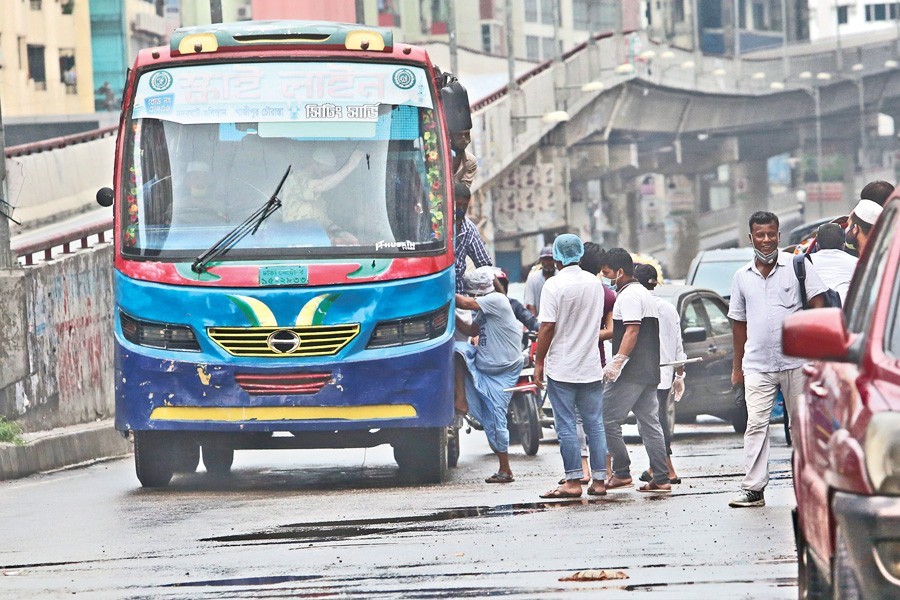Economic policy experts, private sector leaders and health professionals have suggested enforcement of a 'hard' lockdown in the country for some days to help control an unmanageable spike in Covid-19 infections.
Taking part in a virtual dialogue on Thursday, they felt that the country's economy was resilient enough to withstand the loss likely to be caused by the lockdown.
The dialogue was the first one of a series being organised by the Resurgent Bangladesh (RB), a national initiative for Private Sector Recovery Approach in the context of Covid-led economic crisis.
The Resurgent Bangladesh is a joint initiative of the MCCI, the Chittagong Stock Exchange (CSE), the Dhaka Chamber of Commerce and Industry (DCCI). the BUILD, and the Policy Exchange.
Dr. Ahsan H Mansur, executive director of the Policy Research Institute (PRI), while strongly advocating for enforcement of a stringent lockdown said both the government and the private sector do need to understand the fact that short-term harsh measures would deliver benefits in the long term.
He said in the event of high prevalence of Covid-infections, Bangladesh would not be able to reopen its economy when many others by managing the health emergency efficiently would restart their economic activities. In such a situation, foreign investors instead of coming to Bangladesh would start leaving it, he expressed the apprehension.
Dr. Mansur said a critical element such as coordination in the management of many affairs of the government has been missing for long. This is being felt more now, he added.
He felt that the people do deserve to know the full details of Covid-19-related developments in the country. Otherwise, he said, it would be very difficult to develop the much-needed awareness among them.
Ms. Nihad Kabir, president of the Metropolitan Chamber of Commerce and Industry, Dhaka (MCCI), also favoured enforcement of a hard lockdown to ensure health safety of the people on a priority basis.
She felt that the country's economy is resilient enough to ensure welfare of the economically vulnerable groups.
Ms. Kabir said trading partners would stay away from Bangladesh if the novel coronavirus continued to stalk its people.
Dr. M. Masrur Reaz, Chairman, Policy Exchange, at the dialogue proposed a framework for Covid-19 lockdown exit strategy on behalf of the Resurgent Bangladesh. Mr. Asif Ibrahim, former president of DCCI moderated.
Mr. Abul Kashem Khan, chairman, BUILD, while supporting enforcement of a tough lockdown said an exit plan could be put in place once health safety is maximised through minimising risks.
He said an exit plan would become a futile exercise unless it is not implemented properly through the dissemination of authentic information on health and economy.
He felt that impact assessment of Covid-19 was essential.
Taking part in the dialogue, Prof. Mostafizur Rahman, distinguished fellow of the Centre for Policy Dialigue (CPD), said the crisis created by the Covid-19 has brought to the fore the weaknesses relating to the shock absorption capacity of the economy.
While underscoring the need for carrying out reforms in various sectors , he added failure on the part of policymakers in this regard has already given rise to manifold problems.
Mr. Shams Mahmud, president of DCCI said the lack of coordination at the policymakers' level has again surfaced during the ongoing major health emergency. He pleaded for increased investment in the tertiary level of the health sector.
Dr. Shakil Farid of the National Health Service (NHS) of the UK maintained that rate of infection in Bangladesh has been rising exponentially and the situation might become 'unmanageable' within next few weeks.
Mr. Riaz Hamidullah, High Commissioner of Bangladesh in Sri Lanka gave a brief account of how the Sri Lankan government executed a plan meticulously to keep the Covid infection level at a very low level.
Dr. Reaz while proposing the framework for an exit plan gave a brief account of the setback that the Bangladesh economy is likely to suffer because of the pandemic.
He said poverty may go up 14 per cent and the economy which was showing signs of sluggishness well before the pandemic might become even weaker in the coming days. Economic recovery is likely to take between two and five years, he said.
Dr. Reaz said formulation of a 'structured' strategy is essential to help the country come out of lockdown.
Two former bureaucrats Mr. Abdul Karim, Mr. Mosharraf Hossain Bhuyian, Mr. Pranshu Jain of PwC, Mr. Asad Islam, Professor at the Department of Economics, and Director of the Centre for Development Economics and Sustainability (CDES), Monash University and Mr. Rashidul Islam, Genetal Secretary of the Economic Reporters Forum, among others, took part in the dialogue.


